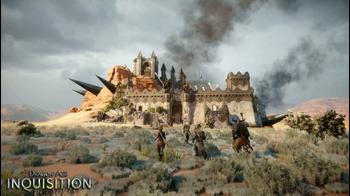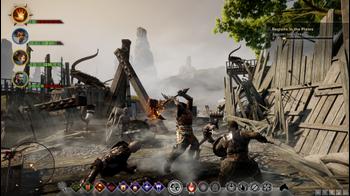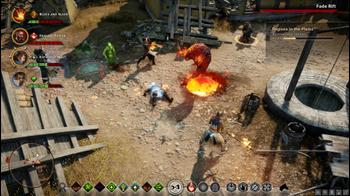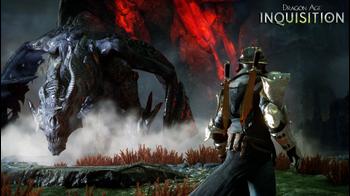
Dragon Age: Inquisition Review
Sitting down to write this review is a rather intimidating task. Dragon Age: Inquisition is a game of alarming size compared to its Bioware-developed forebears, and as I glance over the notes taken during my 100-plus hours with the game, the question in mind is simple: How on earth do I sum all this up?
Dragon Age is a series I've always liked but never loved. I feel the first game was an imperfect evolution and tribute to the groundwork laid in classic titles such as Baldur's Gate, and I felt the second was an even more imperfect attempt to express the ideas that made Mass Effect 2 so fantastic in a different setting with melee-based gameplay.
Dragon Age 2 isn't the bad game that some vocal folk on the internet would have you believe, but it's certainly the worst of Bioware's stellar single-player output during the last console generation - and it's that game's sins that Dragon Age: Inquisition appears determined to atone for with its incredible world design.
The most striking thing about Inquisition ends up being its impressive scale. It's a game that drops you into one large area after another, and eventually I found myself surprised each time the latest huge area wasn't the last. The game continually surprises with a series of sprawling locales, and in a major lesson learned form the second game, all of the geometry is original and bespoke.
One cave or strip of land is no longer replicated across several chunks of the game's huge world, for instance, and I never saw the same land reproduced twice anywhere within the game. While this is likely happening in spots with the formation of foliage or trees, the important thing is that Inquisition covers this up to the point where it can't be seen, and that's commendable.
A massive game world isn't much use without things to do in it, but Inquisition triumphs there, too. The world is vast with a ton of the most archetypal RPG things to do - battles, quests, crafting, gathering materials - and from around an hour in it unceremoniously plops you into its first huge overworld area and turns you loose. While a story-based objective is marked on the map, it's clear that Bioware don't expect this to be the player's focus.
I found myself tumbling clear into their trap - with menial quests to complete, ambient dialogue from my party as I explored, and a number of simple and satisfying check-boxes to explain exactly how your efforts benefit the Inquisition, I got myself lost.
One of the earliest optional story-aiding quests the game points you towards sees you getting access to a Horse and then also gaining the support of a farmer who'll provide horses for the rest of the Inquisition - and by the time I was done messing around with random things in the world and picked up my horse I was 25 hours deep. That was only in the first of the game's huge landmasses. In that time, I'd already explored a huge amount of the Hinterlands area and discovered a far-too-powerful dragon in the wild I knew I'd have to come back and slay later.
The world is beautifully realized and has a great deal more character than either of the previous games. I tested the PC and Xbox One versions, both of which performed brilliantly. Load times are sometimes a touch lengthy, but thanks to the size of areas, you're not loading too often anyway.
It also has to be noted that the latest generation of hardware hasn't lessened some of that classic 'Bioware Jank'. There are issues with lip sync, occasional environmental glitches, and character animations that feel a little clunky for the otherwise pretty models. Taken in the context of the absolutely huge scope of the game, however, this quickly becomes more acceptable.
While it does a good job of feeling a solid rival to it in terms of size, the world of Thedas isn't as seamless as that of Skyrim. Instead of one huge open world, Inquisition is split into several huge chunks - and those chunks are then navigated via a world map. This allows players to skip in a moment from a shady bog to a huge forest and then to a city with a few button presses, and despite menus being the buffer, the world doesn't feel fractured by the decision.
The irony of how I played early on was that I was holding myself back from the meat of the game - while early on the game floods you with a deluge of optional MMO-style fetch quests and basic busy-work, shortly after I knuckled down with the main story, Inquisition opens up in a mechanical sense as you take full control of the titular group.
It's in this that Inquisition offers something new. It gives you control of an actual organization that feels like it wields power, each decision you make helping to shape not only the Inquisition but the wider world. Suddenly there's a strategy layer introduced, and your character is concerned with dispatching allies to deal with problems across the world, doing everything from influencing elections to, of course, slaying demonic hordes.
For me this takes one of the finest moments from one of Bioware's finest games - Mass Effect 2's suicide mission - and spreads it out across the majority of an entire game. Typically choices in Bioware games are about the smaller picture, affecting individual relationships or the outcome of a specific quest, but there Commander Shepard was finally, at last, a Commander. They may have been binary choices, but the player could make tactical decisions for that final mission - and that has now been executed on a wider scale in Inquisition.
It'd be incorrect to describe this system as particularly deep, and even to describe it as strategy feels something of a stretch. There's no real danger in these decisions - the truth is that this is a choose-your-own adventure story where no path outside dying in combat leads to failure - it merely might lead you down a slightly different road to success with different character interactions and reactions along the way. In this sense it isn't that different to the work done in previous Mass Effect & Dragon Age titles, but something bigger out of the decisions made at the 'War Council' would've been nice.
Moreover, none of the choices you face when sitting on the Inquisitor's throne ever really feel difficult. While it falls flat in the end, it's hard not to evoke Fable III when talking about this: in that game you're faced with some genuinely awful decisions with no real upside. Dragon Age quickly falls into the old Bioware trap of being more 'Naughty and Nice' with its choices, instead of asking any truly difficult or morally ambiguous questions.
With that complaint noted, more important than all that is the illusion of power it gives - when my female dwarf came to lead the Inquisition fully, the sense of power the War Council interface provides does wonders for actually getting into the boots and mindset of your character - in short, it's a great way to role play.
The upside for those less interested in that sort of play is that much of that stuff can be ignored, the quests essential to the story clearly marked.
Story-essential questing involves the player character and their party heading out to battle directly. The standard RPG classes of Warrior, Mage & Rogue are present, as the standard Dragon Age race choices from previous games.
In my main save I chose a Dwarf because I thought the concept interesting - I knew that Inquisition's story focused on the magical, and in Dragon Age dwarves can't wield magic. This actually became a recurring point in dialogue throughout the game, which was a nice touch, though there's nothing quite the level of the Origin stories from the first title here - this game is more focused on a worldwide threat.
While Inquisition offers something rather different to the previous two titles in tone, story and exploration, combat feels something of a compromise between the first two titles in the series. The default control method puts you in direct control of one party member with the others controlled by AI routines that players can apply minor edits to through the menus.
This works well enough - the face buttons and shoulder buttons cycle through and execute attacks, and it's really all about filling those traditional roles - my character was primarily a tank, but if I got bored of that role, the beauty is that with a button press I could switch to another party member and control them instead for a little while. One thing that does require you to take control of your player character is closing rifts in the world where monsters are pouring through, a regular objective for your squads.
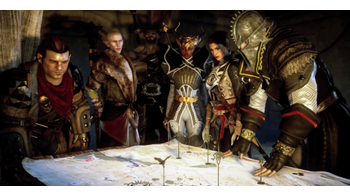
If I had to come up with one criticism of Inquisition's combat it's that on the default difficulty setting it's often too easy, with health dropping to mid-levels but death never really threatening unless you do something silly like throw yourself at an over-powered enemy of a much higher level. I found the challenge much more engaging one bump up from the default, and recommend it - though on that difficulty, proper use of your allies is key.
AI control options allow you to set how frequently allies will consume potions and how many they'll use, while skills can also be set to on, off or preferred, indicating to the AI how much you'd like them to use each skill. If one is an annoyance, you can turn it off for the AI and only use it when you trigger it manually, a handy little feature.
Speaking of manual control, a feature that Bioware has made much of is the return of the the tactical camera. With a simple button press at any time, the player can zoom the camera out, pause the action, and take a more traditional look at things with full control over all party members. This system is inherently less effective with a controller, and I wish the camera zoomed out a little further, but even with that considered the tactical camera is a vital and well-executed resource, especially when participating in battles against larger, more dangerous beasts.
In an interesting touch, potions can't be purchased any more and are simply replenished by visiting one of the Inquisition's base camps - more of which you help to set up as you explore. The game starts you off with a maximum of 8 potions, which works out at 2 per character with the default AI potion-use settings. This essentially limits to you to 8 heals before you head back to camp to restock, which is an interesting choice.
Over time, ways beyond 8 potions present themselves - during some heftier missions, the game sees fit to drop a one-time-use supply cache in your path to prevent a trip back to camp, and eventually you can upgrade the number you can carry. Even so, this potion system completely changes the way you approach combat, for you can no longer brute force your way through with a large number of potions. If you can't survive an encounter with that finite number, you'll need to approach it in a different way - and that works out rather well.
Beyond the basic potion, other potion types can be crafted and equipped but these are far more limited. Generally speaking, there's a slew of resources available out in Thedas for harvesting, from plants to metals and, of course, animal skins, all of which can be used for crafting, which is broken into three key areas: potions, weapons and armor.
There's stores throughout the game providing weapons and armor, but for me the best results always came from crafting and adjusting my own weapons, customized for each party member based on their strengths. Outside of the harder difficulties this is all entirely optional, but it's an area I quickly found myself immersed, frantically searching for the next small ingredient I needed for the next great set of armor.
Beyond equipment, character progression plays out much as you'd imagine. Each cast member fills a traditional class role and can be leveled up within that role to fulfill certain sub-roles. There's a decent breadth of variety in the tech tree, and by the end of the game each character will have fingers in a few ability pies, crossing the boundaries of their specific area of expertise to be more useful. In a touch of kindness, a respec item is sold at one of the game's most frequently accessible stores.
Also interesting are Inquisition perks, bonuses purchased at the war table with points earned by building the Inquisition's power through quests. These provide wider-reaching bonuses to the player and come much less quickly than levels - and so must be chosen more carefully. Picking these was genuinely agonizing at times - but they help to define not only your party in combat, but the Inquisition in general.
I gradually began to favor certain members of the cast over others after a few hours, developing a four-character party setup that felt powerful and fun to control. That's a little of a shame - the playable cast of Inquisition comes in at ten, including the player character, and so it's very easy to quickly forget some with such a large cast.
Generally I feel none of the characters quite reach the zenith some of Bioware's best have achieved, but there's some great personalities nonetheless with some truly brilliant voice performances. There's a decent mixture of newcomers and veterans from Dragon Age's past, too, and the now-traditional snappy, smart banter between party members when exploring returns, providing a great incentive to mix up my party make-up on occasion.
One of my favourite things about the way Inquisition's story is built is that there are several major characters who aren't playable but have a key role in the story nonetheless. Series regular Leliana isn't playable, for instance, but is a constant presence as a key deputy of the Inquisition throughout. Some of these characters even end up as romance options for the player - and I preferred several of these characters to even the playable party members.
As may come across in the barreling, one-after-another way this review addresses its various mechanics, Inquisition's gameplay systems gradually compound upon each other to produce a deceptively compelling time sink of a game. It's the first time in quite a while I've played a game that, when I walked away from it, I kept thinking about - and surprisingly for a Bioware game, it wasn't the story I was thinking about, but everything else.
There are more features I don't have space to mention in this already-long review. Crafting, for instance, has more to it than meets the eye, as do the gigantic dragons that basically act like optional raid bosses. There's some fun mini-game fodder in the form of things like simple horse riding and stargazing-based puzzles - but that's the point. This game is massive.
There's even a co-operative multiplayer mode - not yet mentioned in this review - that plays out similar to Mass Effect 3's excellent online offering. The few times I've been able to find a game on near-empty pre-launch servers I've had fun, but it's hard to judge - but with a campaign that will take 40-some hours even if you rush, it's really little more than a value-add.
If anything suffers as a result of this wide-reaching, impressively large amount of content, it's the fact that a game has a diluted focus. The potentially world-ending threat of Dragon Age: Inquisition doesn't feel to have stakes as real even as the relatively enclosed story of the second game, for instance, and many of the characters don't quite shine quite as brightly as those in Bioware's other titles - in large part because they are no longer the star of the show - that title now belongs to the excellent world of Thedas and the complex, fascinating politics that dominate it.
By offering such a breadth of content and then giving the player great freedom, Bioware greatly risks overwhelming many players - but that risky scattershot approach has, I feel, paid off here. If you're the type of player who loves that kind of freedom, you're in for an incredible treat. It's certainly the best Dragon Age has ever been.
